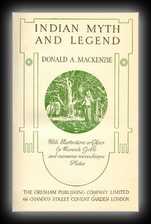
Indian Myth and Legend
by Donald A. MacKenzie
2004
"This is the Gresham Myths and Legends volume for India. Of course, one person's myth is another's religion, in this case nearly a billion people. As opposed to most of the other volumes in this series (e.g. Egypt, Crete, Celtic), these 'Myths and Legends' are the basis for contemporary Hindu beliefs. Certainly, many Jews and Christians would take offense if the events of the Pentateuch were described as 'myths', and I beg the kind indulgence of Hindu readers of this [text].
Like most of the other books at this site, this was written prior to World War I. Mackenzie's discussion of the 'Aryan race' and Indian parallels to Germanic mythology have to be taken in that context. This shouldn't be taken as an endorsement of racist doctrine. Nobody has seriously questioned the reality of Indo-European as a linguistic group, or the aspects of comparative mythology which crop up from India to Iceland. However, the misuse and misrepresentation of these theories led to tragic consequences (unintended by the 19th century scholars who first proposed them), and that has to be kept in mind.
These big caveats aside, this is an enjoyable journey through deep horizons of Hindu mythology, from the earliest nomadic period, through the Vedic and Brahmanic eras, concluding with an extended synopsis of the Mahabharata and Ramayana. The Hindu gods and goddesses are difficult to sort out for beginners; there is no neatly organized family tree, as with Greek, Roman or Northern mythology. This is because the pantheon evolved radically over the millennia that Hinduism has been in practice. Also, there are many non-mutually-exclusive strands of Hindu belief, each of which has its own body of lore of the gods and goddesses. Therefore having a survey of this nature at hand while reading the primary texts is extremely useful.
One last aspect of this book deserves a mention, the transliteration of Sanskrit vowels. Sanskrit actually has a very simple vowel system; however, Mackenzie used a strange variety of acute accents, tildes, umlauts, macrons, and breves, in a very inconsistent fashion. I have scrupulously preserved the transliteration from the book throughout, per site policy. However, these accents can be ignored." (Quote from sacred-texts.com)
Table of Contents:
Publisher's Preface; Preface; Introduction; Indra, King Of The Gods; The Great Vedic Deities; Yama, The First Man, And King Of The Dead; Demons And Giants And Fairies; Social And Religious Developments Of The Vedic Age; Mysteries Of Creation, The World's Ages, And Soul Wandering; New Faiths: vishnu Religion, Buddhism, And Jainism; Divinities Of The Epic Period; Prelude To The Great Bharata War; Royal Rivals: The Pandavas And Kauravas; The Tournament; First Exile Of The Pandavas; The Choice Of Draupadi; Triumph Of The Pandavas; The Great Gambling Match; Second Exile Of The Pandavas; Defiance Of Duryodhana; The Battle Of Eighteen Days; Atonement And The Ascent To Heaven; Nala And DamayantÍ; Wanderings In The Forest; Nala In Exile; The Homecoming Of The King; Story Of Rama: How Sita Was Won; The Rape Of Sita; Rama's Mission Fulfilled
